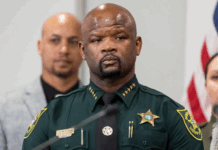Expanding the range of traditionally underfunded teams
By Helen Ross, PGA Tour Special to NNPA Newswire
James Levister thought it would be a phase.
Sure, he was an avid golfer. A 4 handicap at his best, in fact.
But when he started his 3-year-old daughter, Mesha, playing golf, he figured she would eventually get tired of the game.
He was wrong, though. His daughter loved playing with her dad on weekends – she finally beat him when she was 16 and never lost again – and she thrived on the challenge of the game.
“It was our thing,” Mesha said. “I liked that it was hard, and I continued to play because it was hard. But for me, when I was small, it was about being with him and doing something different.”
She played four years of varsity golf and basketball at her Florida high school, got scholarship offers in both sports, and wanted to turn pro. Eventually, she had to choose between the two.
“I told my dad I would rather play golf because there are fewer people that look like me playing golf,” said Levister, who is African American. “I wanted to be a trendsetter. … I felt like I had something to give in the game. I didn’t realize what it was back then as a little 17-year-old.”
On Wednesday, some 23 years later, and on her 41st birthday, no less, Levister was at Memorial Park Golf Course to watch three of the players she coaches at Prairie View A&M University play in the pro-am at the Cadence Bank Houston Open.
Christian Latham, who is working on his master’s degree in architecture, and seniors Rondarius Walters and Taylor Harvey, a member of the women’s team, would play with Phil Griffith, who is a vice president of operations for United Airlines’ Houston hub, and PGA TOUR pros Stewart Cink and Matthew NeSmith.
“I hope that they get an out-of-this-world experience that they may not have ever gotten – ever,” Levister said. “Or that it opens up their eyes to the maximum potential and drives them to be whatever they want to be.”
The pairing with Griffith is no accident. United Airlines, in partnership with the PGA TOUR, has earmarked more than $500,000 in grants to 55 golf teams at HBCUs like Prairie View.
Each school gets $10,000 in travel credits to bolster travel and recruiting budgets and potentially help more than 250 student-athletes compete in places that may have been out of reach.
United and the TOUR recently announced a multi-year extension of their official marketing relationship, extending the annual commitment to HBCUs through 2025.
Griffith also attended a clinic earlier this week in which golfers from another Houston-area HBCU, Texas Southern, worked with youngsters from the First Tee. He’s excited about the impact the grants are having.
“I’m very impressed with these kids and when I look at where I was back then, if you don’t know that something exists, yeah, it’s kind of hard for you to aspire for,” Griffith said. “And a lot of the things that these kids are doing today, I had no aspirations for because I just didn’t know.
“I think as we continue this program,” he added, “just opening their eyes and showing them valuable and effective ways of getting there, it’s going to be a lot of fun over the years. That’s what I’m hoping.”
All in it together
Levister coaches the men’s and women’s teams at Prairie View A&M, which is the second oldest public university in Texas.
She’s also done double duty at North Carolina Central University, as well as at Lincoln University in Jefferson, Missouri.
“It’s interesting to see the dynamic and be able to create a culture here of togetherness and make sure that everybody roots for everybody because we’re all one team,” Levister said.
Forging something of a non-traditional path is second nature to Levister. When the women’s team at her college in Florida disbanded, she was recruited by NCCU to play on its men’s team.
She played No. 1 and was the team’s most valuable player as a freshman, also earning Central Intercollegiate Athletic Association Rookie of the Year honors.
After 9/11, Levister left school and went home to Washington, D.C. She was the first African American to win the 2004 Virginia Women’s Amateur and was named the state’s female golfer of the year. She turned pro in 2006 and joined the Symetra Tour in 2010.
Life on the road could be lonely, though, particularly for a young woman who was often the only African American entered in an event.
“I’m still a golfer, regardless,” Levister said firmly. And she can’t shake the memory of being pulled over by a policeman in New York.
“The cop came over and asked the other tour player that was in the car, who was a white female, instead of asking the normal stuff, he asked the young lady that was in the passenger seat, ‘Are you OK?’” Levister said.
“So, for me that was a little bit of a traumatic experience. … But he let me go. So, he really pulled me over just to check on the person in the car.”
After Levister’s father died in 2014, she decided to quit the tour.
She still competed, winning the 2015 EP Pro Women’s Championship, but began to focus on teaching. She joined the staff at NCCU in 2020 and helped start the women’s program before heading to Prairie View A&M.
She’s only been there about a month, but she already feels accepted by her players, who share her goal of returning the Panthers to dominance in the Southwestern Athletic Conference.
And she wants to make it easier for others to follow her path.
“I am definitely all about how I take on life now,” Levister said.
“I just want to be a good person, do the right thing and break glass ceilings for the next people behind me so they don’t have it as hard as I did.”
Keeping the program alive
When Prairie View A&M lost its golf coach last fall, Latham had just graduated magna cum laude, finishing his architecture degree in three years, and started working on his masters.
But the team needed a coach, and Latham stepped up in a big way.
“He really held the fort down last year for both of the teams,” Levister said.
Like Levister, Latham was a multi-sport athlete who started playing golf because of his dad. But his favorite sport was baseball – his grandfather Cliff Johnson played 20 years in the major leagues, including two World Series with the New York Yankees.
By the time Latham got to high school, though, he had become disillusioned with baseball. He endured racist taunts, many times from the adults, and coaches who flat-out lied to him.
“I lost my passion for baseball,” he said.
“I didn’t even want to play anymore. So that’s what really got me stuck into golf because it’s like at the end of the day, no one can else say anything about me as long as I’m shooting a score I need to shoot.
“So that’s how I really got into it. And I just focus on golf only now. That’s what brought me.”
The summer before he entered high school in Katy, Texas, a Houston suburb, Latham spent every day at the golf course.
He shot 111 in his first tournament, but by the end of the summer, he broke 80 for the first time.
With continued improvement, he began to think about playing in college and verbally committed to Prairie View A&M after his sophomore year.
In addition to studying for his masters, where he’s designing a practice facility for the golf team as a class project, and hitting balls on the range, Latham is getting hands-on experience by working at an architecture firm several days a week.
He also has a 14-month-old son named Kai – who is full of “joy and happiness,” Latham said – half the week.
“He’s like my little twin,” Latham said. “So now I got him a plastic set of golf clubs and seeing him wanting to play with that is pretty cool.”
Just because he’s working on his master’s degree doesn’t mean Latham is giving up on his dream to play golf professionally, though.
He’s already played in one APGA event and hopes to play well enough this year to finish in the top five of its collegiate rankings, which would give him scholarship access to the tour’s events through the remainder of the 2023 season.
“I’m not going to just stop that goal and stop that dream,” he said.
“I’m going to still work hard this semester to try to get to that level or continue to just add on to where I should be.”
Giving players wings
With the travel credits provided by United, schools like Prairie View A&M will be able to compete in higher profile events that might otherwise seem out-of-reach – quite literally.
Levister, who once rode 11 hours from Durham, North Carolina to Port St. Lucie, Florida, for a college tournament, has already started putting those credits to work.
“Even in the short time that I’ve been here, it’s saved us a tremendous amount of time and money just to be able to have access to go over to Houston Airport and to fly,” she said.
“Just to reduce costs of travel helps tremendously because now we can use those funds to give them a better experience as a student athlete and a college golfer.”
Latham remembers a 15-hour bus ride from Houston to Ponte Vedra Beach, Florida, where the Panthers played in – and won – the 2021 PGA Works Championship at TPC Sawgrass.
With two travel days each way and the tournament itself, the Black Panthers were gone nine days.
That’s why on Wednesday Latham planned to thank Griffith for United’s support. That United and organizations like the PGA TOUR are seeing value in HBCU golf has been a big help.
“I want to say it makes us feel more comfortable when we’re not having to travel,” Latham said, “cramped up for 14 hours, 16 hours, when we could just make a two-hour plane ride. And it makes an impact on the team.
“I mean, we’ve had times to where people didn’t even have enough seats on the bus,” he continued, “and we’re just kind of all locked up or having to make multiple trips to get somewhere because we don’t have enough room to bring everybody.
“So, it means a lot. Gives us the opportunity to try to feel more like a sports program because we see other sports programs get to travel like that. And we never necessarily got to.”
The post United Travel Credits Giving HBCU Golf Programs Wings first appeared on BlackPressUSA.

















